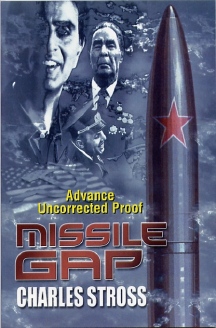 |
 Charles Stross
Charles Stross
Missile Gap
Reviewed by: Rick Kleffel © 2006
Subterranean Press
Deluxe Hardcover First Edition
ISBN 0-596-06058-1
Publication Date: 12-01-2006
99 Pages; $35
Date Reviewed: 06-28-06
Index:
Science Fiction
The members of the Flat Earth Society can take heart. So can those who would like to see Project Orion, the rocket boosters powered by nuclear weapons, come to life. The Yuri Gargarin fan club can rest easy. Charles Stross has come to their rescue, as well as the rest of those who would like to reside in a counter-factual world. Anyone, in fact, who'd like to deny the primacy of reality will get a kick out of 'Missile Gap', so long as they’re willing to put on their thinking cap. That's a pretty long list of people, probably more than there will be copies of 'Missile Gap'. Sign up now, pay in advance, or risk having to live in your own counterfactual world where the novella 'Missile Gap' never saw the light of day.
In our world, however, ARCs are already making the rounds, and we can judge the book based on the facts of its existence. It's by Charles Stross, which means that this is in fact a book of Big Thinks. It's published by Subterranean Press, which means the book will be presented with pristine publication quality. It's illustrated by J. K. Potter, whose art style prefigured Photoshop and who continues to demonstrate that it’s the talent, not the tool. 'Missile Gap' is the kind of book that might leave you with a serious Stross Gap in your collection. Miss 'Missile Gap' at your own peril.
There's plenty of peril to go around in Stross' dense novella. It's set in a 1976 that's rather different than the one most of us remember, but those memories, you will surely think as you read this book, may not be reliable. In 'Missile Gap' the world is flat. And it's not just magical flat, a simple plate to which things stick like refrigerator magnets. It's worked-out-as-if-it-were-really-to-be-the-case flat, it's actual-physics flat, but it's most assuredly not flat writing. Stross has a delightful time working out just how the world could be flat and what the upshot of this might be.
Of course in working this out, he's had to go a bit beyond human science and beyond a simple flat version of the world we know. And there are even human characters wandering about on this space-pancake. Gregor is a spook. Boy is he a spook. He's spooky. Yuri Gargarin gets to pilot the oft-desired "surface effect vehicle," an enormous aircraft carrier beyond the world we know and into some fascinatingly drawn hinterlands. And then there are poor Maddy and Robert Holbright, unfortunate pilgrims at the edge of the world Gargarin is busily mapping. Something big is happening on that flat earth, you betcha. Big enough to blow your mind.
If you're a fan of Charles Stross, a member of one of the various factions listed in the first paragraph, or simply wish to have your sensawunda pegged for an afternoon of pleasant reading, 'Missile Gap' is definitely the hot ticket. It's science fiction of the type that constantly keeps you on edge, the pages turning at a fevered pace, trying to figure out just what the hell is going on here. Stross knows precisely how to burn the brain, how to tickle the intellect, how to drop intellectual bread crumb after bread crumb until your brainy beak feels positively blunted. Then, the revelation, the coalescence, that science fiction as literary genre is all about. It's a guaranteed head rush, and nothing less.
Written in micro-chapters that are practically stand-alone prose poems, 'Missile Gap' is a quintessential work of intellectual science fiction. Oh there are characters, and they engage in all the grunty groveling of the human species. But the real characters here are ideas, bubbles to burst in your brain. This, like 'Accelerando' is one of those science fiction novellas that could actually make some readers afraid to ever read science fiction again. Those readers might wonder what the hell happened and feel as if Stross, who ever keeps his eyes both on the prize and on the ground, slipped them a prose mickey. To put it bluntly, certain readers might not feel that they "got it".
Those who do "get it", however, will feel that ecstatic joy that can only come from reading the best science fiction. I have to say that Potter's plentiful illustrations add a wonderful vibe to the proceedings. They truly seem counterfactual, to come from a reality that doesn't subscribe to the same rules that run things here. If you've ever felt that way yourself, or if you've ever read a really weird and dense piece of science fiction that confounded a friend but thrilled you, then you've come to the right place. If you live on the Flat Earth, or in a world where Project Orion did get off the ground, then you've got a counterfactual copy of the novel. It couldn’t possibly be better than that. Take the novel to the edge of the earth and hurl it off into space. Once your circuits have been blown, you won't need it anymore.
|
 |
